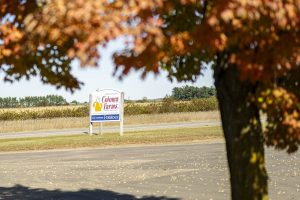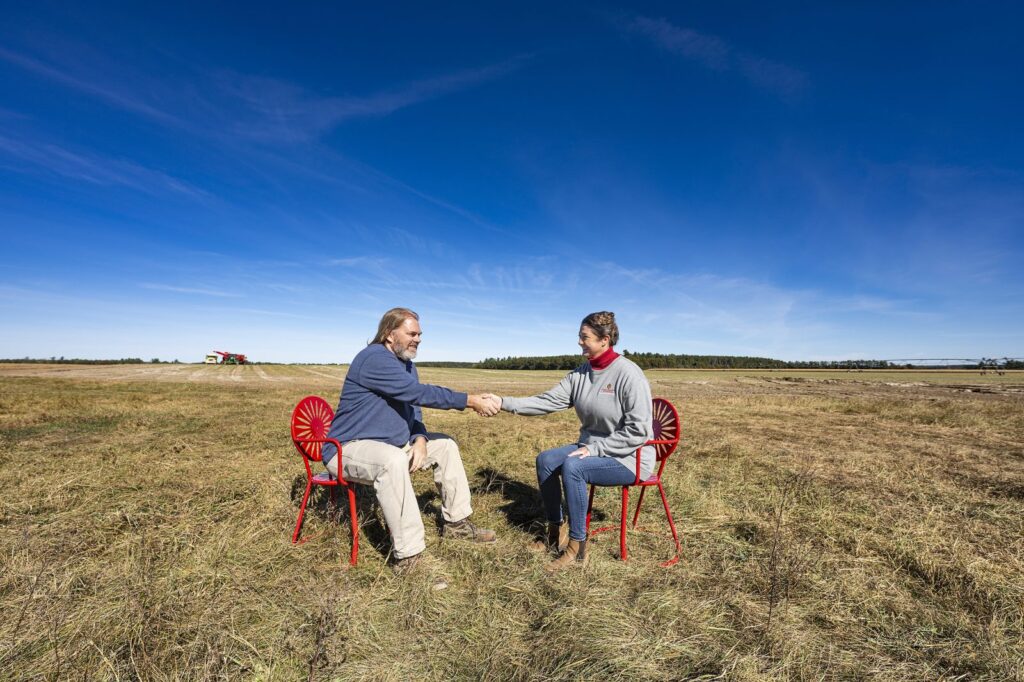Andy Diercks, a fourth-generation potato farmer from the small village of Coloma in central Wisconsin, is blunt about the difficult realities facing family-owned farms today.
“There are days when the choices aren’t always good, and you’re making the least bad choice,” he says. “But we’ve survived well. I’m proud of what we do here.”

For decades, Diercks’s family and farmers across the state have worked closely with vegetable researchers at the University of Wisconsin–Madison to ensure a healthy harvest, from the initial seed supply to disease prevention and management.
Amanda Gevens, a UW–Madison Extension specialist and the department chair of plant pathology, knows all too well the high stakes for Wisconsin farms. She arrived at UW in July 2009 — the same month that a late blight epidemic hit the state for the first time in nearly a decade. Gevens had to learn how to relay critical information to farmers in a timely, useful manner so that they could take action against the debilitating plant disease.
“The intervention that you recommend can save the return for that crop,” she says. “And for very large acreage, that can be in the millions of dollars.”
Tackling the disease triangle
UW researchers are tackling the entire “disease triangle”: the environment (tracked by Blitecast), the pathogen (diagnosed and managed through testing), and the host — that is, the health of the seed. Since 1913, UW–Madison has overseen the Wisconsin Seed Potato Certification Program. The university maintains the state’s potato tissue culture, storing the tiny plantlets of potatoes that seed future commercial production. The year-long inspection process covers the entire growing cycle and even involves shipping seed potatoes to Hawaii during the winter months to continue to observe their health and quality.
‘It’s a great relationship’
Diercks, who graduated from UW in 1993 with a degree in agricultural engineering, operates Coloma Farms alongside his father, Steve. The farm spans 2,700 acres and is a supplier to McCain Foods, the world’s largest manufacturer of frozen potato products. The Diercks family has long collaborated with UW researchers to implement more productive and sustainable practices, and they routinely return the favor by opening their farm to the university for education and research projects.
“They’re not afraid to ask us to change, and we don’t have any problem asking why they’re trying to get us to make some of the changes,” Diercks says. “It’s a great relationship. It’s frankly one of the main reasons I’ve stayed in the farm.”
The close partnership between UW researchers and Wisconsin farmers is also leading to promising innovations. Gevens’s lab is developing a tool that uses aerial imaging from aircraft and satellites to evaluate the health of crops in the ground.
“We’ve developed some models that tell us when the crop has late blight or early blight. We can identify disease in the plant before it’s showing symptoms. We’ve never before been able to do that,” Gevens says. “We think it will help give better information to the farmers in advance of disease.”
Her team is also testing the use of UV light — “almost like dosing using a chemical,” she says — to treat disease while potatoes are in long-term storage.
Gevens grew up working on a small vegetable farm in New York and interacting with agents from the Cornell Cooperative Extension. So it’s no wonder that she feels right at home in her current career and alongside dedicated farmers like Diercks.
“The research team — they’re just really good people,” Diercks says. “We know them socially. They have beers with us at the end of the day. They’re friends. And they’re willing to get out of Madison and grab samples, walk around in the field, get their feet and hands dirty.”
That commitment, he adds, makes them “the best potato research team in the country. And we’re really proud of that.”
Written by Preston Schmitt. Photos by Bryce Richter and Jeff Miller.
Link to original story: https://impact.wisc.edu/uw-madison-researchers-and-wisconsin-farmers-work-together-to-produce-healthy-potato-harvests

